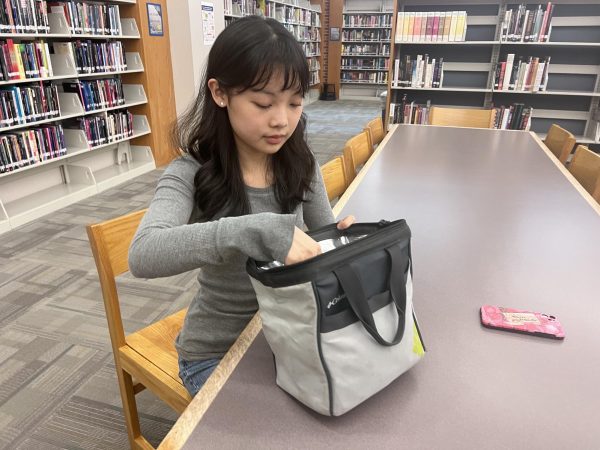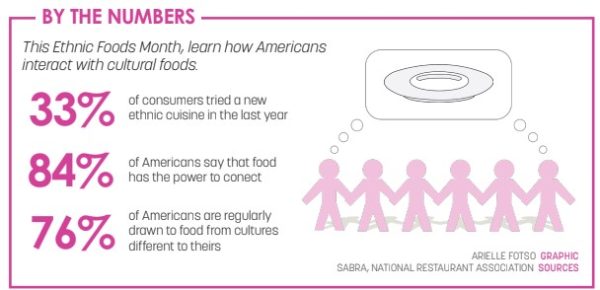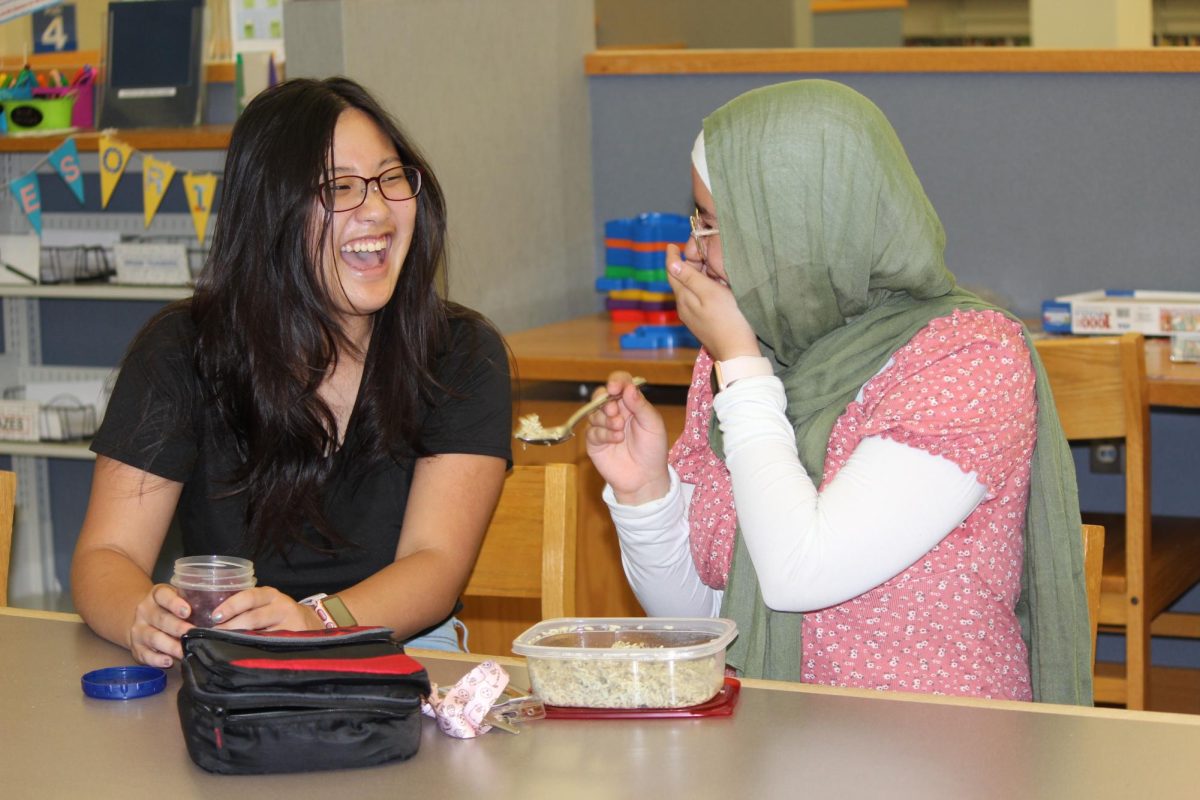For Shrinidhi Yarabolu, president of Carmel Vaitalika and senior, her Indian lunches have always made her feel like a cultural other.
“When I was younger I’d have a lot of insecurity with bringing (ethnic) food as a child, due to the stigma around, like Indian food looking odd or smelling weird,” Yarabolu said. “One example I remember really clearly, was when I brought an Indian dish called perugu annam (curd rice) and normally it’s eaten with, like, a pachadi (pickled vegetables grounded into a paste; usually served as a side or sauce), and some girl in kindergarten said it looked like poop and I started crying. When I was younger, I really didn’t care what people thought of me or my food, like, I would come to school with coconut oil in my hair and stuff like that. But that experience really impacted my confidence. I became a lot more insecure about what people thought about what I ate.”
Like Yarabolu, Jenna Khasawaneh, Arab Student Association officer and senior, said she had similar sentiments about how bringing food from her Jordanian culture made her feel less than.
“I know when I was a kid, I didn’t know anyone who ate (ethnic food), or they would look at me and say ‘What is that?’ People would be disgusted by what I was eating, and I’ve been called a ‘terrorist’ a couple of times as a result,” Khasawaneh said. “For me, I remember being really insecure about my food and culture, I wanted to be white, I wanted to have blonde hair (and) blue eyes. I’ve grown since then, but there’s still a voice at the back of my head sometimes that says ‘Oh you should stop being yourself and just be American.”

Sophomore Ivy Wei said she relates to the discrimination faced by the other students, she said she has been verbally attacked for the food she eats and has been mocked for food wrongfully attributed to Chinese cuisine.
“I distinctly remember being barked at by (a student) during a ‘you are what you eat,’ activity, as though they were trying to imply that I eat dogs,” said Wei.
Yarabolu, Khasawaneh, and Wei are far from being the only people who experience discrimination for their respective cultural backgrounds. In fact, a 2021 study conducted by the American Psychological Association, reports 1 in the 5 non-white students have faced discrimination from their peers because of their cultural/racial identity.
According to a 2021 article from SpringerLink, an international scientific journal, “Food contributes to an individual’s physical and mental well-being and expresses one’s cultural identity through preparation, sharing, and consumption (i.e., foodways). Inadequate access to cultural foods can create cultural stress and affect one’s identity and well-being.” Students from non-white ethnic cultures being ashamed to bring ethnic food to school can create stress and lead to struggles with accepting their unique identity. It can also cause a need to assimilate, which hurts a person’s relationship with their culture. Having different food makes people feel like they need to assimilate and question the validity of their culture, and thus question the validity of their being.

Lunch Staff Opinions on Diverse Lunches
Cafeteria Manager Geneaster Ortiz said she didn’t understand why people discriminate against different foods and hopes to create more acceptance of food through the creation of more diverse school lunches at this school.
“My husband is Puerto Rican-Indian and I’m Black from Chicago, so I’ve been introduced to a lot of different foods from different cultures basically my whole life,” said Ortiz. “Spanish food, Indian food, Greek food, literally every cuisine you can think of, I’ve probably tried. I’m into all of it, I don’t why these kids tease, I would try anything once. If you don’t try it (different food) then you won’t know if you like it or not, and you could be missing out on a cuisine you might really enjoy. I think people are becoming more accepting (of different foods) because we introduce the new food to them. I had a couple family members that wouldn’t try plantains (a type of banana; usually served fried) but when my husband made some for them, they loved them (plantains). This year (at the cafeteria) we’re doing vegan foods, finding Asian recipes without sesame seeds to avoid allergies, and every month we’re trying to include some sort of different element to school lunch to make it more diverse. ”
Wei said she also saw more acceptance for ethnic foods and accredited social media and “cancel culture” for making people more tolerant of different cuisines.
“While cancel culture is not always a good thing, it has made it possible for people to be called out for explicitly insensitive or racist remarks about food and culture. Social media has also made it possible for people to at least have seen new foods.”
Khasawaneh agreed with Wei and said different food was being more widely accepted even by people of different cultures.
“Now, people, like, I’ll be like, ‘Oh have you ever had this (Middle-Eastern food),’ and they’ll be like ‘Yeah I have, it’s really good.’ It’s even to a point where we serve hummus at this school regularly and I didn’t grow up seeing that.”
An Appreciation of Culture
Yarabolu said people around her being more understanding made her start to appreciate her culture more.
“I feel like I appreciate my culture a lot more and there’s a much better sense of understanding (from) the people around me, even, like, the people that used to judge my food,” Yarabolu said. “Them also coming to an understanding has made me come to peace with my culture which is really nice. I also have a lot of ‘American’ friends that want to try the food I bring to school, and it makes me feel, like, really happy and seen. For so long, I was seen as different, and now I feel like I’m finally a part of something, and it’s not, like, a bad thing. It’s a really good thing to have culture.”
Yarabolu also said people being open to try new experiences is one of the best ways to accept different cultures and reduce discrimination.

“Just be open, be ready to try new things, you don’t always have to like it, but if you don’t like it, at least don’t bash it,” Yarabolu said. “Be accepting, it might not be the way you do things but it’s the way someone else does something and you have to respect that. This need for acceptance is actually why I started the Vaitalika Foundation, that helps preserve South Indian culture, and give people of my same, like, ethnic background a chance to help others and be more comfortable in their culture.”
In honor of Ethnic Foods Month, Khasawaneh urges students to have respect for everyone’s culture and not judge someone based on their cultural identity or the food they bring.
“People should learn that everyone is equal, that everyone has different roots, and that you shouldn’t expect everyone to be exactly like you, and that there’s a wide variety of cultures around the world,” Khasawaneh said. Honestly, just don’t judge (people). If you have rude thoughts, keep them to yourself. Also if you have questions, ask them. Most of the people I know they’re very very open to asking questions. I always get questions about my culture… and I’m always happy to answer them and tell people about my culture.”































![What happened to theater etiquette? [opinion]](https://hilite.org/wp-content/uploads/2025/04/Entertainment-Perspective-Cover-1200x471.jpg)














































![Review: “The Immortal Soul Salvage Yard:” A criminally underrated poetry collection [MUSE]](https://hilite.org/wp-content/uploads/2025/03/71cju6TvqmL._AC_UF10001000_QL80_.jpg)
![Review: "Dog Man" is Unapologetically Chaotic [MUSE]](https://hilite.org/wp-content/uploads/2025/03/dogman-1200x700.jpg)
![Review: "Ne Zha 2": The WeChat family reunion I didn’t know I needed [MUSE]](https://hilite.org/wp-content/uploads/2025/03/unnamed-4.png)
![Review in Print: Maripaz Villar brings a delightfully unique style to the world of WEBTOON [MUSE]](https://hilite.org/wp-content/uploads/2023/12/maripazcover-1200x960.jpg)
![Review: “The Sword of Kaigen” is a masterpiece [MUSE]](https://hilite.org/wp-content/uploads/2023/11/Screenshot-2023-11-26-201051.png)
![Review: Gateron Oil Kings, great linear switches, okay price [MUSE]](https://hilite.org/wp-content/uploads/2023/11/Screenshot-2023-11-26-200553.png)
![Review: “A Haunting in Venice” is a significant improvement from other Agatha Christie adaptations [MUSE]](https://hilite.org/wp-content/uploads/2023/11/e7ee2938a6d422669771bce6d8088521.jpg)
![Review: A Thanksgiving story from elementary school, still just as interesting [MUSE]](https://hilite.org/wp-content/uploads/2023/11/Screenshot-2023-11-26-195514-987x1200.png)
![Review: "When I Fly Towards You", cute, uplifting youth drama [MUSE]](https://hilite.org/wp-content/uploads/2023/09/When-I-Fly-Towards-You-Chinese-drama.png)
![Postcards from Muse: Hawaii Travel Diary [MUSE]](https://hilite.org/wp-content/uploads/2023/09/My-project-1-1200x1200.jpg)
![Review: "Ladybug & Cat Noir: The Movie," departure from original show [MUSE]](https://hilite.org/wp-content/uploads/2023/09/Ladybug__Cat_Noir_-_The_Movie_poster.jpg)
![Review in Print: "Hidden Love" is the cute, uplifting drama everyone needs [MUSE]](https://hilite.org/wp-content/uploads/2023/09/hiddenlovecover-e1693597208225-1030x1200.png)
![Review in Print: "Heartstopper" is the heartwarming queer romance we all need [MUSE]](https://hilite.org/wp-content/uploads/2023/08/museheartstoppercover-1200x654.png)



